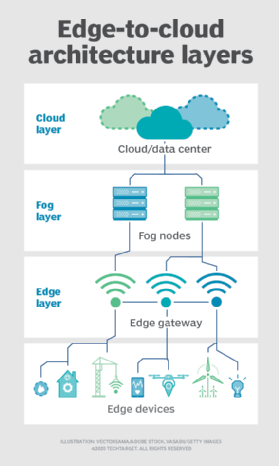Unknown Facts About Edge Networking
Table of ContentsEdge Networking Fundamentals ExplainedEdge Networking Things To Know Before You Get ThisThe Facts About Edge Networking UncoveredEdge Networking Can Be Fun For AnyoneLittle Known Facts About Edge Networking.
CDNs utilize an architecture that dishes out content from cache servers that are inter-networked and distributed around the world into essential places. Web Exchange Points = Significant intersections of international web traffic, typically the borders in between significant providers, ISPs and CDN networks. Edge server = Strategically put server that is geo-located to be as close as possible to the Last Mile of a broad body of endpoints (end gadgets making demands).Point of Presence (POP) or Edge places = Physical hosting area of the nodes in a global network, including network facilities that is housing several edge servers. They are typically located in big cities, near Internet Exchange Points. The simple course that CDNs have positioned themselves into (and are benefiting from) is the fact.
But the rest of the CDN market have already caught up here too, and do these exact same things. So that is CDNs in a nutshell, except in how they funded all the facilities efforts that are now being leveraged into edge networking. All of the above CDN services are in an EXTREMELY commoditized industry. Edge Networking.
The Best Strategy To Use For Edge Networking

The more modern-day CDNs are building their infrastructure in a developer-focused way, exposing APIs to allow consumers better control over the performance of their platform. Edge networks that were developed from software-defined networking (SDN) architectures better permit for this versatility and modification. Programmable edge network APIs can be used as building blocks by consumers, permitting them to much better connect these content management & networking capabilities into their own software application platforms and services.
A giant programmable network between edge and origin. Why do not all CDNs offer this level of control? Due to the fact that they are frozen into their existing network architectures with hardware home appliances, amplified by the heavy number of POPs they then created that they need to inter-network and preserve. Akamai has 216 thousand POPs, but if they now desire to pivot his explanation their architecture! Akamai also now has an edge calculate platform in beta which, I envision, for developers, is like utilizing a monolithic Oracle database (Akamai) rather of being active with MongoDB (Fastly).
Not known Factual Statements About Edge Networking

Being a programmable network means they can take all those networking abilities noted above (WAF, DDOS mitigation, and load balancing) and make them smarter and faster. It permits services to inject more logic within the networking itself, and modifications can propagate quickly. They can use reasoning at any layer, in order to programmatically scale and change networking circulations as preferred.
This makes an IMPORTANT difference in edge networks' architecture over the ones developed by conventional CDN providers. Those important early architecture decisions Fastly took a dogleg towards this strategy back in April 2017, calling it their. Cloudflare joined them quickly afterwards, opening up their global platform to 3rd party apps in June 2017.
Some Of Edge Networking
It sits entirely between the services and the endpoint gadgets using them, as well as between all the edge servers themselves (the entry points into that network). And now, beyond their programmable global networks, comes an even more exciting point-- these business are adding in, in what is called edge compute. Edge networks are an edge cloud platform over both the network AND its edge servers, and can supervise all the traffic in between them all. This focus on being a now allows a lot of benefits that go way, way beyond localized material caching and intermediary security includes that CDNs use.
The CDN capabilities that got them to this point are now (the very first one!) that was constructed on their edge network. New line of product that make certain to emerge mean TAM growth, which will propel their revenue growth rates to far beyond what develop CDN providers normally see. Zscaler (ZS), the next-gen Absolutely no Trust security-as-a-service (SECaaS) supplier, has the specific same type of international networking architecture.
Another focused edge network is Agora (API), who developed an API service for real-time video and audio, then augmented it with a global edge network optimized for click resources real-time video shipment. Edge Networking. Any of the other more generalized edge networks can build similar things and they are! It is long overdue to stop believing of Fastly and Cloudflare as being a part of the commodized CDN market that is simply how they got to this point.